If horses could actually speak words, I am sure they would ask, “got carrots?” Or whatever their favorite snack is. Have you ever noticed how if you have a carrot or cooky, they can barely contain themselves, their focus is entirely on that treat until they find it or get to eat it?
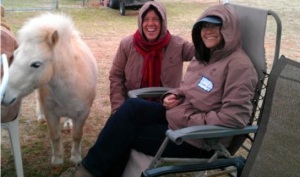
This is why using food in training is a good idea and works really well with a lot of horses. Some horses however, can become dangerous around food and knock you down to get at it. I was noticing the other day that although I have taught that we should not carry food on us while doing liberty training except in rare cases, that some people continue to do this. The horse will follow you around like a dog, and in some cases, be pushy about the treats.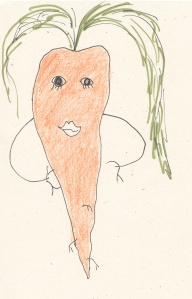
With food training, I want the treats outside the arena or workspace, so the horse has to focus on what I’m asking of him. I want to give one treat and have no others on me. I don’t want to be fighting him off while I’m asking him to stand still while I walk around him, or not pay attention to my instruction to leave when I want him to free lunge or to be led from behind. In one clinic in Oklahoma at Spirit Horse Ranch
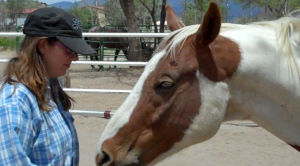
presented by Ruella Yates and Stina Herberg, a mini picked out the one person who didn’t know how to do the liberty training and frisked her pockets. He knew the other participants would be wise to him, so he didn’t go to them. In a clinic I presented this spring, our horse Patches got really excited about the treats he knew were outside the arena, and wouldn’t leave the area where the participants were sitting, just waiting for someone to give him a treat. Pushy, pushy!I had to shoo him away – the lesson was that he could receive a treat when he would sufficiently stop trying to mooch off people. Once I felt him lighten up and pay attention to me rather than the smorgasboard, I would walk him back to the treats. When he saw this was the program, he became very nice to be with and walked nicely with everyone there, eager to show off what he knows.
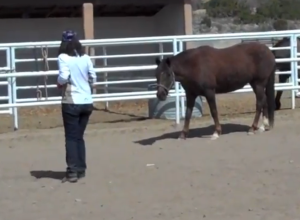 With timid or shy horses (like the one in the photo to the left), it’s okay to carry treats until they get pushy, then you will have to go to Plan B.
With timid or shy horses (like the one in the photo to the left), it’s okay to carry treats until they get pushy, then you will have to go to Plan B.
The other thing about treat training is that when you have the treats on you, you can’t be sure if the horse is ‘performing’ because you’re asking him to or because there is a treat there. I think sometimes we give treats because we are insecure and we want the horse to like us. Of course they will “like” us if we smell like a carrot and better yet, if we are loaded with tasty treats!
I want the horse to get involved in the process and forget about the treat, then when he gets one, he will be more respectful. Usually, once the horse knows that he will get a treat after he pays attention to the exercise, then he will be less anxious about getting one. I will give a treat for an effort. If I feel the horse is not paying attention and avoiding connection, I won’t reward him until I feel the shift I want. It is an energetic shift and you can feel it, a certain pressure drops from the relationship. After awhile it becomes no big deal.
Some horses are disinterested in food, in which case, I will use territory as these are the two things that horses consider vital to their survival.
I also ask that owners not offer treats to their horses while I’m doing bodywork. Because I depend upon the responses of the horse, I need to know that if he is licking and chewing, it’s in response to the work, not to a cooky. I want him to focus on his own body, go inward, and connect up, not thinking about how good the treat is. Generally the horse will get breaks during the session so that he can graze or move around, integrating the work.
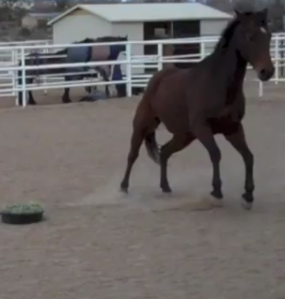
The big lesson the horse is getting in treat training is to learn to listen and be attentive to you, not the treat. This goes a long way when you are later working without treats, and asking more from your horse.
Services: Bodywork (Ortho-Bionomy for people, Equine Positional Release/Equine Ortho-Bionomy): private sessions, tutorials, phone consultations, distance healing and gift certificates
Liberty Training: clinics, mini-clinics, workshops, private and semi-private sessions, tutorials, consultations: by appointment: 505.501.2478 or emailing susansmith@orthohorse.info
Looking forward to fall Liberty Training mini-clinics – Tell a friend and get to experience liberty work together! Dates: September 8, October 5, November 9 – 9-5 p.m. Contact me for details.
Liberty Foundations Waterhole Rituals Equine Clinic at Spirit Horse Ranch near Oklahoma City, co-teaching: Ruella Yates, Certified Carolyn Resnick Trainer and Susan Smith, Suggested CR Trainer. Liberty Horse Training. September 28-29, 2013. Contact Ruella Yates at ruella@libertyfoundations.com, or 405-771-4274. Susan will be giving a three-hour tutorial on her OrthoHorse bodywork for a limited number of students. Call 505-501-2478 or email susansmith@orthohorse.info for details.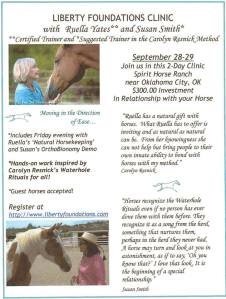



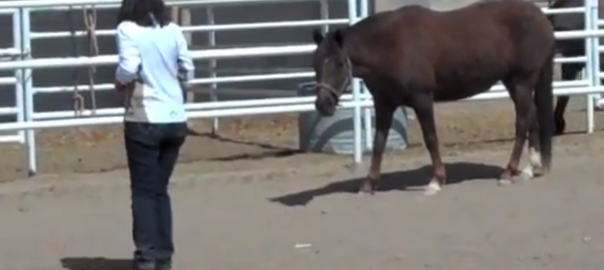
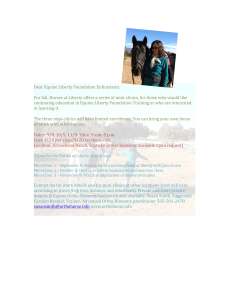
I really enjoyed your post this week, Susan, with the stories of funny happenings during treat-training! This certainly accelerates learning for most horses. I agree: Don’t carry treats on your person!